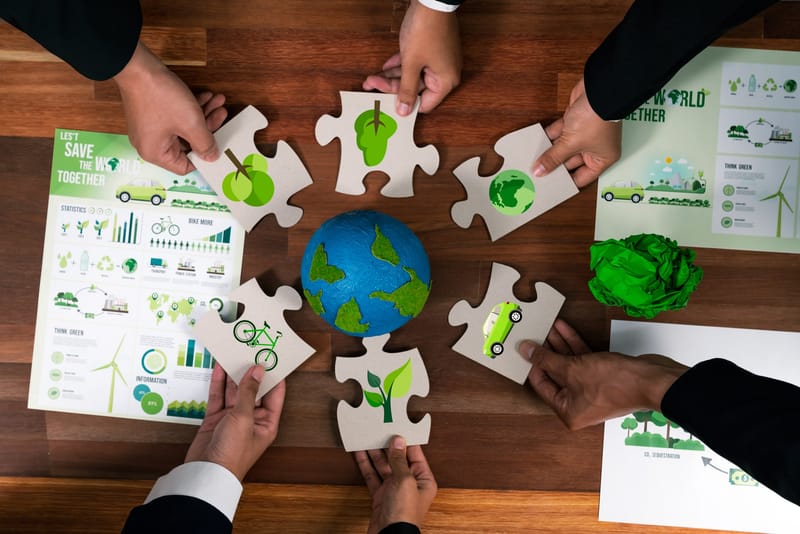
COP28, set to unfold in the vibrant city of Dubai from 30 November to 12 December, promises to be an unprecedented gathering, with 198 countries and an astonishing 75,000 participants converging on its stage.
Among this multitude, a significant and impassioned civil society presence is expected to make its voice heard.
As we embark on this global conference, we’re reminded of the nature of this intergovernmental event, encompassing a vast array of subjects pertaining to global climate action. However, among the intricate tapestry of issues on the table, there are some pivotal ones that demand our attention.
Here, we focus on the game-changing concerns at COP28, ensuring you’re well-informed and ready to delve into the heart of the climate action dialogue.
Global stocktake
COP28 will consider the results of the first Global Stocktake of the impact of national and international climate actions.
The Global Stocktake is a core component of the Paris Agreement, and an important mechanism for monitoring progress on climate commitments; whether we’re on track to limit global warming to 1.5°C, and to debate and agree on course corrections and increases in ambition required to avoid the worst-case climate impacts.
A number of reports, including IPCC 2023 and an IEA Net Zero Pathway 2023 update, already indicate that, globally, we’re not on track. So there will be debates about how to raise ambition, and re-prioritise actions to be included in the next round of national climate commitments that will be ratified in 2025.
Oceans and nature-based solutions
This year’s UN Framework Convention on Climate Change Global Stocktake provides an opportunity to identify gaps and momentum in climate action. It’s a critical tool with which the climate community can highlight new issues and opportunities.
One priority element is that of nature-based solutions, which are essential for the achievement of adequate adaptation, mitigation and resilience outcomes.
COP28's host, the United Arab Emirates, intends to plant more than 100 million mangroves by 2030, capturing an estimated 40,000 tonnes of carbon dioxide annually.
Initially considered a land-use issue, in recent years nature-based solutions have emerged as a key area for climate negotiations. This is for a variety of reasons, including the significance placed on nature by recent IPCC reports, and the emergence of a biodiversity-positive climate agenda emphasised in parallel negotiations of the recently opened convention on biodiversity conservation in areas beyond national jurisdiction.

Nature-based solutions offer a mechanism to absorb carbon and reduce the balance of GHGs, which in turn provides economic potential as a source of credits in carbon markets.
Estimates suggest that up to 37% of the greenhouse gas cuts required to meet the Paris Agreement's 2030 targets could be achieved through nature-based solutions. Blue carbon ecosystems – vegetated coastal and marine ecosystems – have a particularly high capacity to capture and store carbon, estimated at four times that of terrestrial forests.
They store large quantities of the captured carbon in the subsoil beneath, rather than in, the actual plant biomass, which makes them particularly important both in carbon sequestration, but also needing protection, as when damaged or degraded, they can contribute to climate change, altering from a carbon sink to become instead a source of climate change releasing stored gases back into the environment.
In addition to this, the adaptation and resilience benefits coastal ecosystems offer means they’re effectively a bridge in the dialogue between adaptation and mitigation – often balancing both these alongside sustainable development outcomes that support community needs, including poverty reduction, livelihoods, equity, and zero hunger.
Given the multitude of benefits they offer, nature-based solutions receive insufficient investment, an issue likely to be on the agenda at COP28.
This ties in to the consideration of loss and damage provisions, recognising that nature’s ability to perform key ecosystem functions is of particular importance for island countries, where the impacts of climate change are most significant.
Increased attention to nature-based solutions will provide a way to both reduce the risk of disaster in coastal areas, and will be key in facilitating raised country ambitions, as reflected in revised Nationally Determined Contributions, due in two years’ time.
Youth and the Climate Empowerment Action Plan?
Youth play a pivotal role in global climate advocacy, particularly during COP meetings. Their ambition extends beyond mere symbolic gestures; they strive for genuine participation and influence in decision-making.
This desire for substantial involvement is highlighted in both the 2022 COP27 Global Youth Statement and the 2022 UNICEF Climate Justice Roundtable, with a specific emphasis on issues of climate justice.
However, substantial challenges persist in integrating youth perspectives. COP is both daunting and costly, and youth are often relegated to the periphery, limiting their meaningful engagement in negotiations.
Nevertheless, COP28 holds promise for enhanced youth participation.
The UAE presidency has placed a strong emphasis on increasing youth participation, offering a funded Youth Climate Delegates program for their attendance, along with the appointment of a dedicated Youth Climate Champion.
Further, in 2022, youth gained official stakeholder status through the Action for Climate Empowerment Action Plan, which will also significantly bolster the influence of youth in shaping climate policy.
The Action for Climate Empowerment (ACE) agenda is intricately connected with youth engagement and participation, offering immense potential to shape the future of climate action.
ACE, a simplified term for Article 6 of the UNFCCC and Article 12 of the Paris Agreement, has a clear mission – to empower youth (and the public) to engage in climate action.
It achieves this through six essential elements – climate change education, public awareness, training, public participation, access to information, and international cooperation.
YOUNGO, the official youth constituency to the UNFCCC, passionately supports ACE, recognising the influential role of youth, education, and public engagement in driving transformative societal change.
ACE is moving into implementation. The 2022 COP27 ACE Action Plan encouraged countries to establish their own ACE national strategies, focusing on policy coherence, coordinated action, tools and support, and monitoring, evaluation and reporting.
The challenge ahead lies in whether countries can secure the prioritisation, coordination, and funding necessary to develop robust national strategies. COP28 will serve as a pivotal moment in assessing ACE’s future impact.
Wrap-up and ‘blue-sky thinking’ for COP28 outcomes?
COP28 is significant because it will play a crucial role in assessing the effectiveness of the Paris Agreement and its impact on the global effort to limit global warming to 1.5°C.
The question looms: Will this conference usher in true transformative, system-wide change, or will it be marked by familiar promises? We should start to gain an understanding of whether keeping warming to 1.5 or even 2°C is even possible.
Simultaneously, COP28 serves as a pivotal moment in acknowledging the valid concerns surrounding the underrepresentation of the world’s most vulnerable, including small developing island states and youth, within COP processes.
The fundamental question we face is whether COP28 will genuinely embrace diverse perspectives as we work towards a global climate action framework rooted in principles of equity and human rights.
Monash University will host a pavilion in the official Blue Zone of COP28 this year. Our aim is to empower diverse voices from across the Indo-Pacific and influence superior policy outcomes across a broad range of issues, working with, and for, communities via diverse international and cross-sectoral partnerships.
This is related to the issue of loss and damage, which is a cross-cutting issue, about compensating developing nations for the global damage caused by industrialised nations.
Join the action and follow our events at the Monash pavilion online here.





